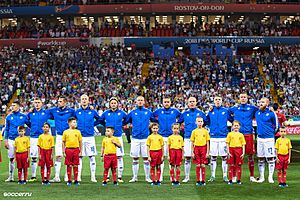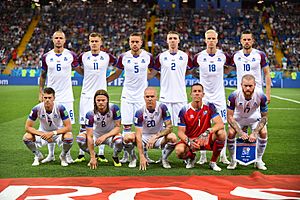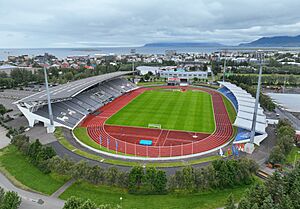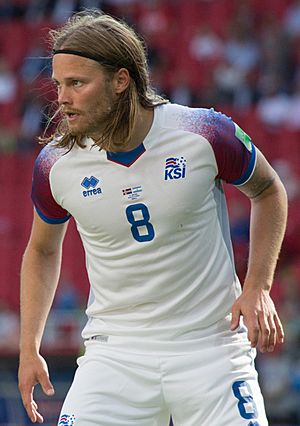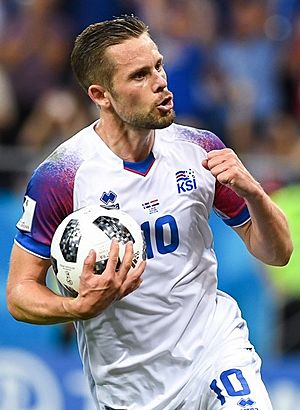Iceland national football team facts for kids
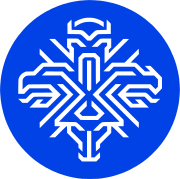 |
|||
| Nickname(s) | Strákarnir okkar (Our Boys) | ||
|---|---|---|---|
| Association | Knattspyrnusamband Íslands (KSÍ) | ||
| Confederation | UEFA (Europe) | ||
| Head coach | Arnar Gunnlaugsson | ||
| Captain | Orri Óskarsson | ||
| Most caps | Birkir Bjarnason (113) | ||
| Top scorer | Gylfi Sigurðsson (27) | ||
| Home stadium | Laugardalsvöllur | ||
| FIFA code | ISL | ||
|
|||
| FIFA ranking | |||
| Current | 38 |
||
| Highest | 18 (February–March 2018) | ||
| Lowest | 131 (April–June 2012) | ||
| Elo ranking | |||
| Current | 47 |
||
| Highest | 19 (October 2017) | ||
| Lowest | 128 (August 1973) | ||
| First international | |||
| Unofficial (Tórshavn, Faroe Islands; 29 July 1930) Official (Reykjavík, Iceland; 17 July 1946) |
|||
| Biggest win | |||
| Unofficial (Keflavík, Iceland; 10 July 1985) Official (Vaduz, Liechtenstein; 26 March 2023) |
|||
| Biggest defeat | |||
(Copenhagen, Denmark; 23 August 1967) |
|||
| World Cup | |||
| Appearances | 1 (first in 2018) | ||
| Best result | Group stage (2018) | ||
| European Championship | |||
| Appearances | 1 (first in 2016) | ||
| Best result | Quarter-finals (2016) | ||
| Greenland Cup | |||
| Appearances | 2 (first in 1980) | ||
| Best result | Champions (1980, 1984) | ||
| Baltic Cup | |||
| Appearances | 1 (first in 2022) | ||
| Best result | Champions (2022) | ||
The Iceland men's national football team represents Iceland in international football games. The team is known as Strákarnir okkar, which means Our Boys in Icelandic. The Football Association of Iceland controls the team. Iceland has been a member of FIFA since 1947 and UEFA since 1957.
The team had great success in the late 2010s. They almost made it to the 2014 FIFA World Cup playoffs. Iceland then reached their first big tournament, UEFA Euro 2016, after beating the Netherlands twice. At Euro 2016, they surprised everyone by beating England to reach the quarter-finals. They were then knocked out by host nation France. Iceland also became the smallest country to ever qualify for the FIFA World Cup in 2017, playing in the 2018 tournament. They even drew with Argentina in their first match there.
Contents
Team History
Early Days of Icelandic Football
The first official international match for Iceland was on July 17, 1946, in Reykjavík. They lost 0–3 to Denmark. Their first international win was against Finland in 1947. For many years, the team did not often try to qualify for the FIFA World Cup or the UEFA European Championship. In 1958, Iceland played in World Cup qualifiers for the first time but lost all their games.
In 1980, Iceland won the first Greenland Cup, which was a friendly tournament. Since 1974, the team has taken part in qualifiers for every World Cup and European Championship. In 1994, they reached their highest FIFA World Rankings spot at the time, 37th. This was beaten in 2016 when they reached 21st. A special moment happened in 1996 when Eiður Guðjohnsen played in the same international match as his father, Arnór Guðjohnsen.
Football in the 21st Century
In the qualifiers for Euro 2004, Iceland finished third in their group, just missing out on a playoff spot. After this, the team had some tough years. They often finished near the bottom of their groups in qualifiers. For example, in the Euro 2008 qualifiers, they had some big losses.
For a long time, Icelandic football faced challenges. There weren't many professional players, and the cold, long winters made it hard to train outdoors. However, in the 2000s, things changed a lot. Money was invested to build indoor football fields with artificial turf. This meant young players could train all year round, no matter the weather. These new facilities helped more young people get into sports.
In 2014, Iceland nearly qualified for their first World Cup. They finished second in their group and played Croatia in a playoff. After a 0–0 draw at home, they lost 2–0 away.
Euro 2016 Success
Iceland made history in 2015 by qualifying for a major tournament for the first time. They finished second in their group for Euro 2016, losing only two games. They even beat the Netherlands (who had finished third in the 2014 World Cup) twice during qualification. This helped them reach their highest FIFA ranking at the time, 23rd.
At the Euro 2016 tournament, Iceland drew their first two group matches against Portugal and Hungary. They then won 2–1 against Austria to move on from their group. In the Round of 16, Iceland caused a big upset by beating England 2–1. This win was a huge moment for the team. They were eventually knocked out by host nation France in the quarter-finals, losing 5–2.
2018 World Cup Debut
Iceland qualified for the 2018 FIFA World Cup on October 9, 2017, after a 2–0 win against Kosovo. This was their first time ever in the World Cup. They also became the country with the smallest population to reach the finals. Iceland was placed in a tough group with Croatia, Argentina, and Nigeria.
Their first World Cup match was against 2014 runners-up Argentina, and Iceland managed a fantastic 1–1 draw. However, they lost 2–0 to Nigeria and then 2–1 to Croatia in their final group game. Iceland finished last in their group with one point and was eliminated.
Recent Challenges
After their big successes, Iceland faced some difficult times. In the 2018–19 UEFA Nations League, they lost all four of their games. They also had a tough time in the Euro 2020 qualifiers. They finished third in their group but made it to the playoffs. In a very close playoff game against Hungary, Iceland was leading 1–0 until the last few minutes but lost 2–1 after Hungary scored two quick goals.
The team also struggled in the 2020–21 UEFA Nations League, losing all their matches and being moved down to a lower league. The coach, Erik Hamrén, resigned after this.
The 2022 World Cup qualifiers also started poorly for Iceland. The team faced some challenges outside of football that affected player availability and led to changes in the Football Association. Iceland ended up in second-to-last place in their group and did not qualify. These results were due to a mix of factors, including new players needing time to play together and other issues.
The Euro 2024 qualifiers also had a difficult start. Iceland lost to Bosnia 0–3 but then had their biggest official win ever, beating Liechtenstein 7–0. The coach, Arnar Viðarsson, was replaced by Åge Hareide. Under the new coach, Iceland lost to Slovakia and Portugal. Despite a good effort against Portugal, they lost 0–1 to a late goal by Cristiano Ronaldo. Iceland finished 4th in their group but still had a chance in the playoffs. In the playoff semi-final, they beat Israel 4–1. However, in the final match against Ukraine, Iceland lost 2–1 after leading at half-time.
In the 2024–25 UEFA Nations League, Iceland was moved down to League C for the next season. They finished 3rd in their group, beating Montenegro twice but losing heavily to Wales and Turkey. They then played in promotion/relegation playoffs against Kosovo. Iceland lost both games, 1–2 away and 1–3 at home (played in Spain due to stadium renovations), meaning they will play in League C next season.
Team Look and Supporters
The Iceland national team wears blue for their home games and white for their away games. Their team badge, adopted in 2020, shows special guardian spirits from Icelandic stories: a giant, a dragon, a bull, and an eagle. Before this, their badge had the letters KSI (for the Football Association of Iceland) and stripes like the Flag of Iceland.
Icelandic fans became famous for their "Viking Thunder Clap" chant in the mid-2010s. This involves fans clapping their hands above their heads and shouting "huh!" to the beat of a drum. This tradition became well-known during Euro 2016.
Kit Providers
The team's official uniforms are made by the German company Puma since 2020. Before that, other companies like Umbro, Adidas, ABM, Reusch, and Erreà made their kits.
| Kit provider | Period |
|---|---|
| 1975 | |
| 1976–1991 | |
| 1992–1996 | |
| 1996–2001 | |
| 2002–2020 | |
| 2020– |
Team Staff
Players
Current Squad
Here are the players who were chosen for the friendly matches in June 2025 against Scotland and Northern Ireland.
Caps (games played) and goals are correct as of June 10, 2025, after the match against Northern Ireland.
| No. | Pos. | Player | Date of birth (age) | Caps | Goals | Club |
|---|---|---|---|---|---|---|
| 1 | GK | Elías Rafn Ólafsson | 11 March 2000 | 7 | 0 | |
| 12 | GK | Hákon Valdimarsson | 13 October 2001 | 20 | 0 | |
| 13 | GK | Anton Ari Einarsson | 25 August 1994 | 2 | 0 | |
|
|
||||||
| 2 | DF | Logi Tómasson | 13 September 2000 | 10 | 1 | |
| 3 | DF | Daníel Leó Grétarsson | 2 October 1995 | 24 | 0 | |
| 4 | DF | Victor Pálsson | 30 April 1991 | 50 | 3 | |
| 5 | DF | Sverrir Ingi Ingason | 5 August 1993 | 59 | 3 | |
| 17 | DF | Aron Gunnarsson | 22 April 1989 | 107 | 5 | |
| 19 | DF | Dagur Dan Þórhallsson | 2 May 2000 | 7 | 0 | |
| 23 | DF | Hörður Björgvin Magnússon | 11 February 1993 | 50 | 2 | Unattached |
|
|
||||||
| 6 | MF | Ísak Bergmann Jóhannesson | 23 March 2003 | 35 | 4 | |
| 7 | MF | Jóhann Berg Guðmundsson | 27 October 1990 | 99 | 8 | |
| 8 | MF | Hákon Arnar Haraldsson (vice-captain) | 10 April 2003 | 22 | 3 | |
| 11 | MF | Jón Dagur Þorsteinsson | 26 November 1998 | 46 | 6 | |
| 14 | MF | Þórir Jóhann Helgason | 28 September 2000 | 19 | 2 | |
| 15 | MF | Willum Þór Willumsson | 23 October 1998 | 18 | 0 | |
| 16 | MF | Stefán Teitur Þórðarson | 16 October 1998 | 30 | 1 | |
| 18 | MF | Mikael Anderson | 1 July 1998 | 33 | 2 | |
| 20 | MF | Kristian Hlynsson | 23 January 2004 | 4 | 0 | |
| 21 | MF | Arnór Ingvi Traustason | 30 April 1993 | 67 | 6 | |
| 24 | MF | Mikael Egill Ellertsson | 11 March 2002 | 21 | 1 | |
|
|
||||||
| 9 | FW | Sævar Atli Magnússon | 16 June 2000 | 6 | 0 | |
| 10 | FW | Albert Guðmundsson | 15 June 1997 | 41 | 10 | |
| 22 | FW | Andri Guðjohnsen | 29 January 2002 | 34 | 9 | |
Recent Call-ups
These players have also been called up to the Iceland squad in the last year.
| Pos. | Player | Date of birth (age) | Caps | Goals | Club | Latest call-up |
|---|---|---|---|---|---|---|
| GK | Lúkas Petersson | 9 January 2004 | 0 | 0 | v. |
|
| GK | Patrik Gunnarsson | 15 November 2000 | 4 | 0 | v. |
|
|
|
||||||
| DF | Bjarki Steinn Bjarkason | 11 May 2000 | 5 | 0 | v. |
|
| DF | Valgeir Lunddal Friðriksson | 24 September 2001 | 16 | 0 | v. |
|
| DF | Alfons Sampsted | 6 April 1998 | 23 | 0 | v. |
|
| DF | Rúnar Þór Sigurgeirsson | 28 December 1999 | 2 | 0 | v. |
|
| DF | Hlynur Freyr Karlsson | 6 April 2004 | 1 | 0 | v. |
|
| DF | Kolbeinn Finnsson | 25 August 1999 | 14 | 0 | v. |
|
| DF | Hjörtur Hermannsson | 8 February 1995 | 29 | 1 | v. |
|
| DF | Brynjar Ingi Bjarnason | 6 December 1999 | 17 | 2 | v. |
|
|
|
||||||
| MF | Arnór Sigurðsson | 15 May 1999 | 34 | 2 | v. |
|
| MF | Júlíus Magnússon | 28 June 1998 | 5 | 0 | v. |
|
| MF | Andri Baldursson | 10 January 2002 | 10 | 0 | Unattached | v. |
| MF | Gylfi Sigurðsson | 8 September 1989 | 83 | 27 | v. |
|
|
|
||||||
| FW | Orri Óskarsson (captain) | 29 August 2004 | 16 | 7 | v. |
|
| FW | Brynjólfur Willumsson | 12 August 2000 | 2 | 1 | v. |
|
|
INJ Withdrew due to injury. |
||||||
.
Team Records
- Players in bold are still active with Iceland.
Most Games Played
| Rank | Player | Caps | Goals | Career |
|---|---|---|---|---|
| 1 | Birkir Bjarnason | 113 | 15 | 2010–2022 |
| 2 | Aron Gunnarsson | 107 | 5 | 2008–present |
| 3 | Rúnar Kristinsson | 104 | 3 | 1987–2004 |
| 4 | Birkir Már Sævarsson | 103 | 3 | 2007–2021 |
| 5 | Jóhann Berg Guðmundsson | 99 | 8 | 2008–present |
| 6 | Ragnar Sigurðsson | 97 | 5 | 2007–2020 |
| 7 | Kári Árnason | 90 | 6 | 2005–2021 |
| 8 | Hermann Hreiðarsson | 89 | 5 | 1996–2011 |
| 9 | Eiður Guðjohnsen | 88 | 26 | 1996–2016 |
| 10 | Gylfi Sigurðsson | 83 | 27 | 2010–present |
| Ari Freyr Skúlason | 83 | 0 | 2009–2021 |
Top Goal Scorers
| Rank | Player | Goals | Caps | Ratio | Career |
|---|---|---|---|---|---|
| 1 | Gylfi Sigurðsson | 27 | 83 | 0.33 | 2010–present |
| 2 | Kolbeinn Sigþórsson | 26 | 64 | 0.41 | 2010–2021 |
| Eiður Guðjohnsen | 26 | 88 | 0.3 | 1996–2016 | |
| 4 | Alfreð Finnbogason | 18 | 73 | 0.25 | 2010–2023 |
| 5 | Ríkharður Jónsson | 17 | 33 | 0.52 | 1947–1965 |
| 6 | Birkir Bjarnason | 15 | 113 | 0.13 | 2010–2022 |
| 7 | Ríkharður Daðason | 14 | 44 | 0.32 | 1991–2004 |
| Arnór Guðjohnsen | 14 | 73 | 0.19 | 1979–1997 | |
| 9 | Þórður Guðjónsson | 13 | 58 | 0.22 | 1993–2004 |
| 10 | Tryggvi Guðmundsson | 12 | 42 | 0.29 | 1997–2008 |
| Heiðar Helguson | 12 | 55 | 0.22 | 1999–2011 |
Tournament History
FIFA World Cup Appearances
Iceland has played in one FIFA World Cup tournament.
| FIFA World Cup record | Qualification record | |||||||||||||||
|---|---|---|---|---|---|---|---|---|---|---|---|---|---|---|---|---|
| Year | Round | Position | Pld | W | D | L | GF | GA | Squad | Pld | W | D | L | GF | GA | |
| Not a FIFA member | Not a FIFA member | |||||||||||||||
| Did not enter | Did not enter | |||||||||||||||
| Did not qualify | 4 | 0 | 0 | 4 | 6 | 26 | ||||||||||
| Did not enter | Did not enter | |||||||||||||||
| Did not qualify | 6 | 0 | 0 | 6 | 2 | 29 | ||||||||||
| 6 | 1 | 0 | 5 | 2 | 12 | |||||||||||
| 8 | 2 | 2 | 4 | 10 | 21 | |||||||||||
| 6 | 1 | 0 | 5 | 4 | 10 | |||||||||||
| 8 | 1 | 4 | 3 | 6 | 11 | |||||||||||
| 8 | 3 | 2 | 3 | 7 | 6 | |||||||||||
| 10 | 2 | 3 | 5 | 11 | 16 | |||||||||||
| 10 | 4 | 1 | 5 | 14 | 20 | |||||||||||
| 10 | 1 | 1 | 8 | 14 | 27 | |||||||||||
| 8 | 1 | 2 | 5 | 7 | 13 | |||||||||||
| 12 | 5 | 3 | 4 | 17 | 17 | |||||||||||
| Group stage | 28th | 3 | 0 | 1 | 2 | 2 | 5 | Squad | 10 | 7 | 1 | 2 | 16 | 7 | ||
| Did not qualify | 10 | 2 | 3 | 5 | 12 | 18 | ||||||||||
| To be determined | To be determined | |||||||||||||||
| Total | Group stage | 1/18 | 3 | 0 | 1 | 2 | 2 | 5 | — | 116 | 30 | 22 | 64 | 128 | 233 | |
UEFA European Championship Appearances
Iceland has played in one UEFA European Championship tournament.
| UEFA European Championship record | Qualifying record | |||||||||||||||
|---|---|---|---|---|---|---|---|---|---|---|---|---|---|---|---|---|
| Year | Round | Position | Pld | W | D | L | GF | GA | Squad | Pld | W | D | L | GF | GA | |
| Did not enter | Did not enter | |||||||||||||||
| Did not qualify | 2 | 0 | 1 | 1 | 3 | 5 | ||||||||||
| Did not enter | Did not enter | |||||||||||||||
| Did not qualify | 6 | 1 | 2 | 3 | 3 | 8 | ||||||||||
| 8 | 0 | 0 | 8 | 2 | 21 | |||||||||||
| 8 | 1 | 1 | 6 | 3 | 13 | |||||||||||
| 8 | 2 | 2 | 4 | 4 | 14 | |||||||||||
| 8 | 2 | 0 | 6 | 7 | 10 | |||||||||||
| 8 | 1 | 2 | 5 | 3 | 12 | |||||||||||
| 10 | 4 | 3 | 3 | 12 | 7 | |||||||||||
| 8 | 4 | 1 | 3 | 11 | 9 | |||||||||||
| 12 | 2 | 2 | 8 | 10 | 27 | |||||||||||
| 8 | 1 | 1 | 6 | 6 | 14 | |||||||||||
| Quarter-finals | 8th | 5 | 2 | 2 | 1 | 8 | 9 | Squad | 10 | 6 | 2 | 2 | 17 | 6 | ||
| Did not qualify | 12 | 7 | 1 | 4 | 17 | 14 | ||||||||||
| 12 | 4 | 1 | 7 | 22 | 19 | |||||||||||
| To be determined | To be determined | |||||||||||||||
| Total | Quarter-finals | 1/14 | 5 | 2 | 2 | 1 | 8 | 9 | – | 110 | 35 | 19 | 66 | 120 | 179 | |
UEFA Nations League History
| UEFA Nations League record | ||||||||||
|---|---|---|---|---|---|---|---|---|---|---|
| Season | Division | Group | Pld | W | D | L | GF | GA | P/R | Rank |
| 2018–19 | A | 2 | 4 | 0 | 0 | 4 | 1 | 13 | 12th | |
| 2020–21 | A | 2 | 6 | 0 | 0 | 6 | 3 | 17 | 16th | |
| 2022–23 | B | 2 | 4 | 0 | 4 | 0 | 6 | 6 | 23rd | |
| 2024–25 | B | 4 | 8 | 2 | 1 | 5 | 12 | 18 | 27th | |
| Total | 22 | 2 | 5 | 15 | 22 | 54 | 12th | |||
Team Achievements
Regional Cups
- Nordic Football Championship
- Runners-up (1): 2000-01
- Baltic Cup
- Champions (1): 2022
Friendly Tournaments
- Greenland Cup
- Champions (2): 1980, 1984
- China Cup
- Runners-up (1): 2017
FIFA Ranking Over Time
This table shows Iceland's position in the FIFA World Rankings each year.
| 1992 | 1993 | 1994 | 1995 | 1996 | 1997 | 1998 | 1999 | 2000 | 2001 | 2002 | 2003 | 2004 | 2005 | 2006 | 2007 | 2008 | 2009 | 2010 | 2011 | 2012 | 2013 | 2014 | 2015 | 2016 | 2017 | 2018 | 2019 | 2020 | 2021 | 2022 | 2023 | 2024 |
|---|---|---|---|---|---|---|---|---|---|---|---|---|---|---|---|---|---|---|---|---|---|---|---|---|---|---|---|---|---|---|---|---|
| 46 | 47 | 39 | 50 | 60 | 72 | 64 | 43 | 50 | 52 | 58 | 58 | 93 | 94 | 93 | 90 | 83 | 92 | 112 | 104 | 90 | 49 | 33 | 36 | 21 | 22 | 37 | 39 | 46 | 62 | 63 | 71 | 70 |
More About Icelandic Football
- Iceland national under-21 football team
- Iceland national under-19 football team
- Iceland national under-17 football team
- Iceland national futsal team
- Iceland women's national football team
See also
 In Spanish: Selección de fútbol de Islandia para niños
In Spanish: Selección de fútbol de Islandia para niños
 | John T. Biggers |
 | Thomas Blackshear |
 | Mark Bradford |
 | Beverly Buchanan |


